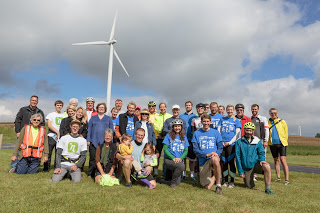by jboullion | Nov 18, 2016 | Uncategorized
For Immediate Release – November 18, 2016
For More Information: Tyler Huebner, Executive Director, 608-255-4044 ext 1
(Madison, WI). In today’s open meeting, the Public Service Commission
sharply hiked the monthly “fixed charge” that Alliant Energy’s Wisconsin Power
& Light residential electricity customers will face by 95%, from $7.67 per
month up to $15 per month.
 |
| The Public Service Commission of Wisconsin building in Madison. |
The “fixed charge” is the base fee which all customers must
pay each month, no matter how much energy they use. Overall, Alliant’s residential customers will
see their monthly electricity bills increase by 4-5%.
By contrast, the fixed charge that Alliant’s Iowa customers
must pay every month remains at $10.50.
“Increasing the fixed charge will raise bills for customers
that use smaller amounts of electricity monthly, such as seniors,
apartment-dwellers, and energy-conscious customers including those who have
installed solar panels,” said Tyler Huebner, RENEW Wisconsin’s Executive
Director.
RENEW Wisconsin and a broad set of stakeholders have opposed
hikes in fixed charges since 2014,
when these requests first appeared.
“Wisconsin electricity customers now pay dramatically higher
fixed charges than their counterparts in other states,” said Tyler Huebner,
RENEW Wisconsin’s Executive Director.
“
Our testimony documented that the vast majority of state agencies
nationally are either rejecting these fixed charge hikes outright, or granting
much smaller increases, and only in Wisconsin are these fees being nearly
doubled.”
As documented by RENEW in testimony, the increase in fixed
charges granted to U.S. investor-owned utilities since 2014 has averaged about
14%. But for the five investor-owned
utilities in Wisconsin, the average fixed charge increase has been 83%.
-END-
RENEW Wisconsin leads and accelerates the transformation to
Wisconsin’s renewable energy future through advocacy, education, and
collaboration. More information on RENEW’s web site at www.renewwisconsin.org.
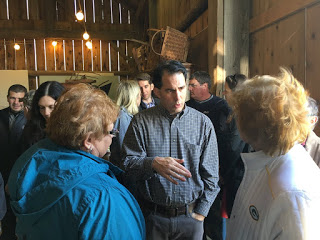
by jboullion | Nov 18, 2016 | Uncategorized
For immediate release
November 18, 2016
More information
Tyler Huebner, Executive Director
608.255.4044
tyler.huebner@renewwisconsin.org
 |
Governor Scott Walker at Heritage Farm in Kewaunee,
with RENEW’s Tyler Huebner in the background. |
Yesterday, RENEW Wisconsin was in the audience as Governor Scott Walker announced the State of Wisconsin’s intention to invest in biodigesters that will turn dairy
manure into renewable energy while assisting with improvements in water
quality.
Governor Walker announced that the Public Service Commission, Department of Natural Resources, and Department of Agriculture, Trade, and Consumer Protection are working together to deliver a Request for Proposals in January 2017. The request for proposals will allow private firms to submit bids to meet the goals and specifications set out by the agencies.
A major goal of the initiative is to aid with water quality problems in environmentally sensitive areas of the state, and the announcement was made in Kewaunee, one of those regions. Governor Walker indicated that this initiative is one of a series of steps, and not in and of itself the only solution, needed to aid water quality in Kewaunee County.
Wisconsin is the national leader in deploying biodigesters, also known as anaerobic digesters, on farms. We have 34 farms with digesters in Wisconsin. These systems turn cow manure into solids, liquids, and methane, which is an energy resource that is the primary component of what we commonly call “natural gas.”
In many of the digesters on farms in Wisconsin today, the methane is cleaned and passed through a generator to create electricity, which is sold to the local power company. Most of these digesters are located right on the premises of the dairy farms.
The system envisioned by the Governor’s announcement, according to a recent interim order from the Public Service Commission, might collect manure from farms of all sizes, and process it in a centralized biodigester. Instead of using the methane to create electricity, it could be further cleaned and then injected into the natural gas delivery system. Natural gas is used to heat homes and businesses as well as power industrial processes. (The PSC’s interim order can be found here, see pages 9 thru 11).
“Biodigesters present a win-win-win for renewable energy, the environment, and farmers. These systems are the ultimate recycle and reuse operation,” said Tyler Huebner, Executive Director of RENEW Wisconsin. “Moreover, Wisconsin is blessed with companies that know how to design, engineer, build, and operate these systems such as Chilton-based DVO, Inc., BIOFerm Energy Systems of Madison, Miron Construction of Neenah, Symbiont of West Allis, and Clean Fuel Partners of Madison.”
Digesters process manure in a way that can enable water quality improvement technologies to be added onto the system. Dane County has been investing in these systems over the past half-decade to accomplish similar water quality improvement goals, and their recently passed County Budget includes $18 million to inject methane collected at the landfill into the natural gas pipeline system, similar to what the state may be envisioning.
“Digesters can provide a lot of benefits when they are designed, engineered, and operated with proven technologies and by companies that have delivered solutions that work. Leadership, collaboration, and transparency will be needed throughout the process to ensure the project’s success. The State’s leadership and funding commitment is a solid next step to bringing more digesters online in Wisconsin,” concluded Huebner.

by jboullion | Oct 25, 2016 | Uncategorized
RENEW Wisconsin sent the below letter of support for the Biomass Thermal Utilization Act, which would extend a 30% investment tax credit to high efficiency biomass thermal energy systems, to Wisconsin’s Senators Baldwin and Johnson, and Representatives Duffy, Grothman, Kind, Moore, Pocan, Ribble, Ryan, and Sensenbrenner.
I am writing to communicate RENEW Wisconsin’s strong support for the Biomass Thermal Utilization Act (BTU Act), sponsored by Senators King and Collins and Congressmen Welch and Gibson. If adopted, the provisions of the BTU Act will help accelerate installation of high efficient biomass thermal systems in communities around the country. This would drive economic development up and down the biomass value chain, including the creation of new jobs to serve the biomass fuel delivery infrastructure needed to supply these systems.
The BTU Act would add biomass thermal energy technologies to Sections 25D and 48 of the tax code, therefore extending a 30% investment tax credit to high efficiency biomass thermal energy systems. This would level the playing field with other renewable energy technologies that already qualify for investment tax credits. While biomass thermal does not need a permanent investment credit, the high initial capital cost is the major obstacle to broader market adoption. The current tax structure is unfair to biomass thermal technologies and is hindering the industry’s growth.
The proposal was scored by the Joint Committee on Taxation at $134 million over 10 years. RENEW Wisconsin supports a 5-year authorization which reduces its estimated cost to the U.S. Treasury to $67 million.
Please vote in support of the BTU Act (S. 727 and H.R. 1145) during the next legislative session, so the biomass thermal energy industry will begin 2017 driving economic development on a level playing field with other renewable energy technologies.
Sincerely,
Tyler Huebner
Executive Director, RENEW Wisconsin
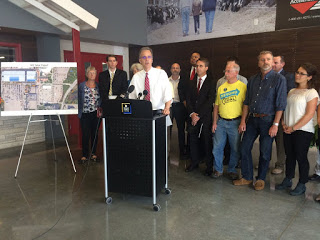
by jboullion | Oct 21, 2016 | Uncategorized
 |
Dane County Executive Joe Parisi announces
solar initiatives for the 2017 budget |
In late September, Dane County Executive Joe Parisi unveiled plans to triple the amount of county-owned solar generation–from 330 kilowatts to 1 megawatt–and convert the county’s main landfill into a source of clean renewable methane for injection into a nearby natural gas pipeline. A portion of the landfill’s output will power 75 heavy-duty vehicles in the county’s fleet by the end of 2017. See the press release here.
In advance of the County Board’s budget hearing on October 19, RENEW expressed its vigorous support for Parisi’s initiative in a letter circulated to Dane County supervisors. Please contact your supervisor and ask him or her to support the clean energy provisions in the 2017 budget proposal.
See our letter of support below:
Date: September 19, 2016
To: Sharon Corrigan
Chair, Dane County Board of Supervisors
Jenni Dye
Chair, Personnel and Finance Committee
From: Tyler Huebner, Executive Director
Michael Vickerman, Program and Policy Director
Re: Clean Energy and Climate Change Provisions in the 2017 Dane County Budget Proposal
We write to communicate RENEW Wisconsin’s strong support for the clean energy and climate-change related provisions that appear in the proposed 2017 budget now before the County Board. If adopted, these provisions would greatly enhance the County’s ability to bring about a clean energy future for its citizens and its own operations. The investments contemplated in the capital budget will reduce energy-related expenses over the long term while generating new revenue streams that can help fund county operations or provide tax relief, while the creation of a new Office of Energy and Climate Change will enable Dane County to coordinate a forward-looking emissions reduction strategy with municipalities and other key stakeholders.
We endorse the following provisions in the capital budget:
1. The investment of more than $2 million to build solar generation systems totaling 770 kilowatts at the Alliant Energy Center and the Dane County Jobs Center. These arrays will reduce pollution from county operations while lowering the county’s electric bills by more than $2 million over 20 years. We note that the County Executive’s office took great care to situate the new solar generating capacity at locations that will generate the greatest monetary savings. Adding the new arrays to its existing portfolio of systems will result in one megawatt of county-owned solar generation, by far the largest commitment of any Wisconsin county to what has become an affordable and locally available source of clean energy.
2. The investment of $18 million on infrastructure to produce pipeline-grade methane from the Rodefeld Landfill and enough compressed natural gas to power 75 county-owned vehicles by the end of 2017. This far-sighted initiative will enable Dane County to convert its Rodefeld facility from an electricity-generating energy center to one that supplies clean methane to a nearby pipeline. Transitioning the energy infrastructure at Rodefeld in this manner will insulate the County from the economic impact of drastically reduced electricity buyback rates in 2018. Indeed, the production of a low-carbon renewable fuel would generate a significant revenue stream likely to offset the initial investment in less than four years. This initiative would further advance the progress Dane County has already achieved in substituting renewable methane for fossil fuels to fuel its fleet of patrol trucks and snow plows.
We endorse the following provision in the operations budget:
The creation of an Office of Energy and Climate Change within the County Executive’s Office. The purpose of this new office is to lead, shape and steer climate change mitigation strategies undertaken by public and private entities throughout the county. Several Dane County communities, most notably Madison, Middleton and Monona, have on their own launched significant initiatives to reduce fossil fuel emissions. The individual hired to staff this office would develop a countywide approach for engaging such stakeholder groups as municipalities, electric providers and businesses. Key near-term objectives for this office will be the formation of a Dane County Council on Climate Change, and the development of an action plan that integrates today’s piecemeal efforts into a coordinated and resourceful program.
The initiatives proposed in the 2017 budget would build upon a record of success in the clean energy and emissions reductions arenas, one that the County Executive and the County Board can take pride in. In recognition of Dane County’s achievements and its desire to lead the way on clean energy development and reducing greenhouse gas emissions, we urge the County Board to approve the budget provisions that will accelerate the momentum already in evidence.
Sincerely,
Tyler Huebner
Executive Director
Michael Vickerman
Program and Policy Director
cc: Dane County Board of Supervisors
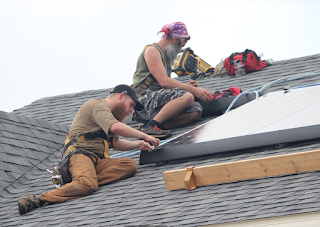
by jboullion | Oct 20, 2016 | Uncategorized
Today, the Public Service Commission of Wisconsin authorized
approximately $7.7 million in rebates spanning 2017 and 2018 to spur small,
customer-based renewable energy projects throughout Wisconsin.
The rebates go to residential, business, and non-profit
customers of eligible Wisconsin utilities, and enable the customers to install
renewable energy technologies including solar, geothermal, biogas, biomass and
small wind systems.
 |
| Full Spectrum Solar installs a solar PV system via the MadiSUN program |
|
Tyler Huebner, Executive Director of RENEW Wisconsin, said,
“From our renewable energy perspective, Chairperson Ellen Nowak may have said
it best in her concluding remarks, stating, ‘This is a great win for
Wisconsin.’ Indeed, continuing the highly successful renewable energy rebates
for 2017 and 2018 is a great win. This
level of renewable energy rebate funding should support upwards of 500 solar
electric home installations, 70 or more home geothermal installations, and
dozens of larger business renewable energy projects for each of the next two
years. The program will help our
residents save money and our companies stay cost-competitive.”
The Commission asked Staff to recommend how the renewables
funding should be split between residential and business projects, as well as a
review of the incentive levels in light of the fact that technology prices for
renewable energy systems, specifically solar electric systems, have been
dropping very quickly in recent years.
RENEW Wisconsin will provide our recommendations, and those of the
renewable energy industry, to Commission Staff in the coming days.
In addition, the Commission will evaluate spending $10-$20
million to expand biogas production from anaerobic digesters on dairy
farms. Staff and program administrators
will be developing biogas program options for the Commission to investigate
within 30 days, along with program options for increasing Focus on Energy’s
energy efficiency and renewable energy impacts in rural Wisconsin.
The Commission agreed to lower its cash reserve from $30
million down to $5 million, which freed up dollars carried over from previous
years to be put into programs starting in 2017.
Huebner said, “We applaud the Commission freeing up millions of dollars
of ratepayers’ money from previous years to be put into programs now that will
enable energy and dollar savings for customers across Wisconsin.
RENEW Wisconsin was the lead advocacy organization promoting
the continuation of the renewable energy rebates. We provided two separate memos describing the
history and status of the renewable energy industry and its relationship with
Focus on Energy and advocating for a continuation of rebates. In addition, a sign-on letter promoting
continuation of renewable energy rebates, which was supported by 41 businesses
and organizations from throughout Wisconsin, was delivered to the PSC as part
of the public comment period in this proceeding.
The PSC had authorized a renewable energy loan program in
2014 and allocated $10 million to it over four years. Today, approximately two years into the
program, the PSC decided to end the program and spend the remaining funds
instead on rebates, which had outperformed the loan program in that two year
period.
Biogas production through anaerobic digesters will also see
a boost. The PSC re-committed to
spending $6.4 million on this technology, which it had authorized in 2014. An initial plan to focus on smaller dairy
farms was not as effective as envisioned.
Today, the PSC authorized the creation of an interagency working group
to identify opportunities to expand this technology and its benefits of
renewable energy production, water quality improvements, and on-farm revenue
stability, and indicated that programs between $10 and $20 million should be
investigated to spur this technology.
In its comments to the PSC, RENEW pointed out that we have
world-class companies working in anaerobic digesters right here in Wisconsin
that can help make this program a success.

by jboullion | Oct 5, 2016 | Uncategorized
 This past Sunday, October 2nd, RENEW Wisconsin hosted our 4th annual Ride with RENEW! While the day started off cloudy and a bit rainy, we finished our 33 mile ride in sunshine. We saw some fantastic renewable energy installations in the Fond du Lac area, and with a deadline of Friday, Oct 7th, we have raised $14,800 towards our $15,000 goal!
This past Sunday, October 2nd, RENEW Wisconsin hosted our 4th annual Ride with RENEW! While the day started off cloudy and a bit rainy, we finished our 33 mile ride in sunshine. We saw some fantastic renewable energy installations in the Fond du Lac area, and with a deadline of Friday, Oct 7th, we have raised $14,800 towards our $15,000 goal!
Thank you to all 202 donors who supported our Bike Ride this year thus far, and if you haven’t yet had the chance, please consider helping us meet the final $200! With that, we will successfully meet our $15,000 fundraising challenge from John and Mary Frantz for the 4th year in a row, bringing our 2016 total up to $30,000 for RENEW Wisconsin! We are honored by the continued generosity of John and Mary, and all our other supporters over the past 25 years.
We continued our trend of increasing ridership each year with a new record high of 41 riders this year! Thanks so much to everyone who turned out on Sunday.
This year, we were lucky enough to have Brian Kolstad of Wisnet.com accompany us as our official photographer, and he got some great shots! We put together an album on Google Photos so everyone can see the highlights of the day.
Special thanks to our sponsors, and also our excellent hosts from Fond du Lac: Jeanne & John McDowell and Tom Schuppe. We couldn’t have done it without all their hard work!
Ride Summary
We began the day with brief overviews of the renewable energy measures taken by UW-Fond du Lac and Fond du Lac High School, which are right next to each other. David Demezas told us how UW-Fond du Lac incorporates a demonstration solar panel into its curriculum, while Margie told us about the process Fond du Lac High School went through to install geothermal heating and cooling at the facility that saves the school $290,000 annually on its energy bill.
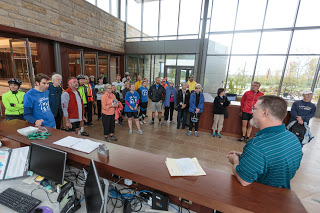
Next, we rode along the freshly completed Fond du Lac Bike Loop to Grande Cheese’s new research center and headquarters. Grande Cheese applied for LEED Gold certification, and we got to tour with Scott to learn about all the energy efficiency measures taken by Grande Cheese. And, it gave us a chance to warm up inside!
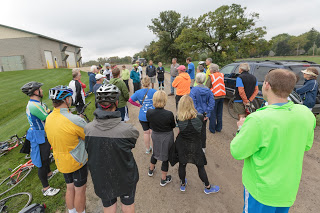
After our tour of Grande Cheese, we stopped at Vir Clar Farm, a 2,000 head dairy farm, to visit the anaerobic digester there. Grant Grinstead, fourth generation owner of Vir Clar Farm, gave us the details on why a digester made sense for his family, farm, and community. The farm is “producing milk and power for America” – enough power for 800 homes.
Then we had our most difficult climb of the day, a ride up the Niagara Escarpment to our lunch destination, Eden Community Center. Thanks to Eden Meat Market Catering for our delicious meals, and to Agnesian Healthcare for sponsoring our lunch!
After lunch we headed to the Cedar Ridge Wind Farm in Eden, WI, owned and operated by Alliant Energy. Brian Dierksheide of Alliant Energy told us about the wind farm, which produces enough energy for 17,000 homes’ annual usage in the area! Brian said throughout the lifetime of the wind farm, it has displaced enough coal to fill a coal train 80 miles long – pretty impressive.
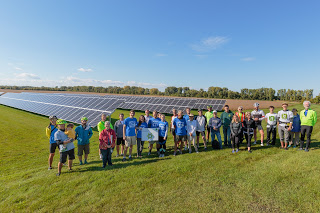
Finally, on our longest leg of the trip, we headed to the Sisters of St. Agnes’ 250 kilowatt solar array. With the sun shining bright for the first time all day, Sister Sue spoke with us about why her congregation decided to install solar, and Jesse Michalski of Eland Electric, who installed the project and sponsored this stop, told us how the project operates.
Overall, it was a great day of riding and renewable energy! A huge thank you to everyone who helped us make this event possible, particularly all our generous donors, John and Mary Frantz for once again providing the match, and our local hosts, Jeanne & John McDowell and Tom Schuppe.
If you donated $35 or more, you are now considered a member of RENEW and we are happy to have you with us. You will receive e-newsletters from us and can keep up to date via our website and blog.











